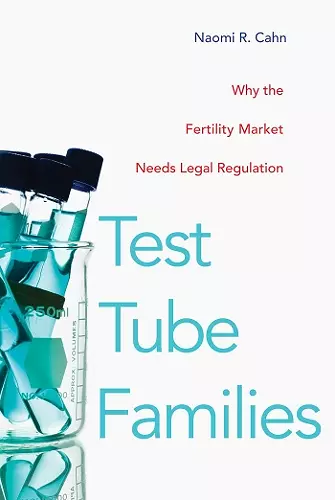Test Tube Families
Why the Fertility Market Needs Legal Regulation
Format:Hardback
Publisher:New York University Press
Published:1st Jan '09
Currently unavailable, and unfortunately no date known when it will be back

Discusses how the demand for donor eggs and sperm has spawned a booming industry in the US with few rules
The birth of the first test tube baby in 1978 focused attention on the sweeping advances in assisted reproductive technology (ART), which is now a multi-billion-dollar business in the United States. Sperm and eggs are bought and sold in a market that has few barriers to its skyrocketing growth. While ART has been an invaluable gift to thousands of people, creating new families, the use of someone else’s genetic material raises complex legal and public policy issues that touch on technological anxiety, eugenics, reproductive autonomy, identity, and family structure. How should the use of gametic material be regulated? Should recipients be able to choose the “best” sperm and eggs? Should a child ever be able to discover the identity of her gamete donor? Who can claim parental rights?
Naomi R. Cahn explores these issues and many more in Test Tube Families, noting that although such questions are fundamental to the new reproductive technologies, there are few definitive answers currently provided by the law, ethics, or cultural norms. As a new generation of "donor kids" comes of age, Cahn calls for better regulation of ART, exhorting legal and policy-making communities to cease applying piecemeal laws and instead create legislation that sustains the fertility industry while simultaneously protecting the interests of donors, recipients, and the children that result from successful transfers.
In the United States, there is a competitive market in human eggs provided for reproductive purposes. An 'extraordinary' egg donor can earn as much as $50,000 when she offers her eggs to an infertile couple. In California, however, that same 'extraordinary' individual would receive nothing, aside from payment for her direct expenses, if she provided those same eggs for research purposes. That could change soon. -- Naomi Cahn and June Carbone * Los Angeles Times *
Test Tube Families explores autonomy implicitly by examining the nature of relationships involved in the process of assisted conception using medical technology, and focusing on the reulatory environment in the USA. -- Hazel Biggs * Feminist Legal Studies *
Cahns case for a uniform, federal legal code is compelling and vivid. * Publishers Weekly *
In her historical and contemporary analysis of legal regulation in each of these areas, she weaves erudite yet accessible translations of law, vivid depictions of cases, and personal insights to portray an industry critically in need of oversight. * New England Journal of Medicine *
In describing the lengths to which people will go in order to produce a biological child, Cahn is both respectful of this very human desire and sensitive to the ethical and legal issues that result . . . That she also writes in accessible prose makes this a valuable text. * Choice *
In her careful and detailed analysis, Cahn builds a lawyerly case for comprehensive federal and state laws governing infertility treatment and establishing the legal rights and obligations of everyone involved in the process. * Bitch Magazine *
Professor Cahn proposes some useful reforms. Her proposals include legal consistency, particularly over the identity of donor conceived children and the rights of parents; transparency; a requirement to test gametes for serious genetic conditions; the provision of counseling to & consumers; and restrictions on the number of donations by any one donor. * Bio News *
ISBN: 9780814716823
Dimensions: unknown
Weight: 544g
304 pages